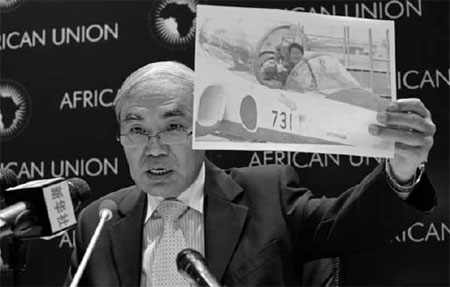Beijing rebuts Tokyo's Africa claims
China's cooperation with Africa indeed differs from Japan's, but not the way Tokyo says it does, officials and observers said on Wednesday.
Foreign Ministry spokesman Hong Lei said China's programs in Africa cover the continent in many areas, including developing people's livelihood and maintaining regional peace.
"China's aid - not only giving a fish, but teaching how to fish - helps improve the self-development of African people," Hong said at a daily news conference. "Moreover, China always abides by its promises."
Hong said that since 1963, China has sent more than 18,000 medical personnel to 48 African countries, treating more than 200 million people.
"In terms of cooperation in natural resources, China purchases energy from Africa at fair prices while helping enhance the continent's pricing power in the global market," he said.
On Sunday, Japanese Prime Minister Shinzo Abe said "job creation and technology transfers" differentiate Japan's efforts in Africa from those of China, Europe and the United States.
"The benefits of rich resources should be used to create sustained growth and a better life for citizens, and Japanese corporate investment will transfer technology to local hands and create jobs," Abe said at an investment forum in Mozambique.
In an attempt to broaden diplomatic reach, Abe paid his first visit this year to Cote d'Ivoire, Mozambique and Ethiopia.
Describing the continent as "a new frontier of Japanese diplomacy", Abe pledged to increase aid and investment, including an aid package of $320 million to the continent and assistance worth $25 million to South Sudan.
Hong dismissed the promises as unhelpful.
"Japan claims to boost employment in Africa, but how do you do that if there is no industry to support?" Hong said. "We will wait to see how far the aid programs Abe promised will go."
Although the Japanese government denied that Abe sought to compete against China in making the trip, analysts said he was emphasizing throughout the trip that Japanese priorities differ from those of other countries.
Zhang Hongming, an African studies researcher at the Chinese Academy of Social Sciences, said Japan aims to offset China's influence in Africa by increasing its input to the continent, similar to what Abe did in Southeast Asia last year.
"Japan is also courting African countries to diversify its energy sources and to support its avid pursuit of permanent membership in the United Nations Security Council," Zhang said. "It might affect China's market share in Africa, but that would call for an enormous Japanese investment."
Japan, a longtime aid donor to Africa, has been beefing up its assistance to the continent in recent years. In June, Tokyo hosted nearly 40 African leaders and pledged $14 billion in development aid over the next five years, as well as promises of billions more in private investment.
Lyu Yaodong, a researcher of Japan studies under the Chinese Academy of Social Sciences, said Abe thinks Japan's technological investment will help improve African ecological conditions.
"That's the concept Abe is trying to convince the continent of during this trip: The Japanese development model in Africa is more advanced than the Chinese one," Lyu said.
Zhang said Africans know Abe is making the effort only because China has been cultivating close bonds with Africa for decades.
Japan's Nikkei Asian Review said on Tuesday that Abe is undertaking an aggressive diplomacy to showcase the advantages of joining with Japan and help Japanese private businesses catch up with foreign rivals in Africa.
"Bolstering ties with Africa will also strengthen Japan's leverage in the international community," the report said.
Abe visited 25 countries last year, his first year in office, including all 10 Southeast Asian countries. He also stopped in major oil producers in the Persian Gulf, plus Turkey, Poland and Mongolia.
Contact the writers at [email protected] and [email protected]
AP contributed to this story.
|
Xie Xiaoyan, the Chinese ambassador to Ethiopia, holds up a photo showing Japanese Prime Minister Shinzo Abe in a fighter jet during a news conference in Addis Ababa, Ethiopia, on Wednesday. Carl de Souza / Agence France-Presse |
(China Daily 01/16/2014 page11)















